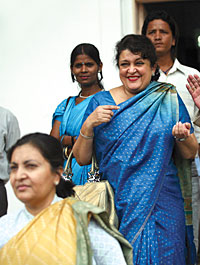 KIRAN PANDAY |
Maoist chairman Puspha Kamal Dahal said after his Politburo meeting this week that his party will lead a national government. How that will be possible considering the non-Maoist parties are on the other side is difficult to imagine. Maybe the strategy is to split the big parties, but then domestic and international geo-politics are both against them.
Egged on by hardliners, Dahal is finding it difficult not to go along with the Baidya Plan to foment anarchy and ride a wave of chaos to capture state power. What the Maoists couldn't achieve with armed struggle and elections, they will now try to do by mobilising a mass movement on the streets.
Meanwhile, the reason for the delay in constitution-writing is not just because the cabinet is still incomplete after four inductions. It is because the Maoists have put up roadblocks every step of the way in the committees.
They have changed their mind on their proposal to create 11 federal provinces and two sub-provinces, and are now proposing the addition of two ethnic units and to make all languages spoken by more than one per cent of the population 'national' languages. The intention is clear: to use identity politics and stir ethnic passions to bolster their power base. They have changed their mind about an executive president being elected by the people and now want the president to be elected by parliament.
Of the three drafts, the one submitted to the Committee on the National Interest got stuck over the Maoists proposal for compulsory conscription of all 18-year-old Nepali males. The only reason to bring up such a hare-brained scheme at the present time is to stall the whole process.
Similarly, the Committee for Safeguarding the Basis of Cultural and Social Solidarity is deadlocked over semantics and the Maoist insistence on calling their 10-year insurgency a 'people war'.
The UML, NC and other parties say they are against Maoist attempts to impose totalitarianism, but have remained mute spectators to all this. Instead of trying to create a united stance against Maoist moves, they are hopelessly split. They haven't even been able to appoint the head of the Constitutional Committee to replace Madhav Kumar Nepal after he became premier.
Maoist leaders have admitted publicly that the new constitution is an obstacle to total state capture. They have said they will not allow a constitution to be written unless they have a majority voice in the assembly.
This raises the question: is all this just a charade to sabotage the new constitution?


